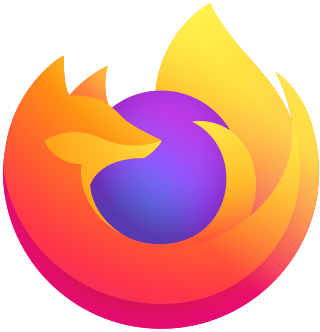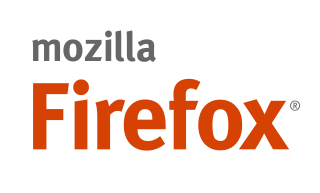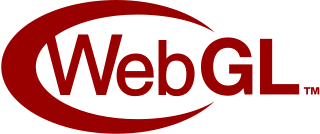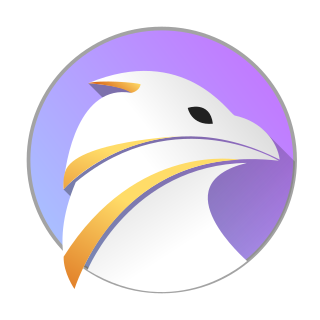A computing platform, digital platform, or software platform is an environment in which software is executed. It may be the hardware or the operating system (OS), a web browser and associated application programming interfaces, or other underlying software, as long as the program code is executed using the services provided by the platform. Computing platforms have different abstraction levels, including a computer architecture, an OS, or runtime libraries. A computing platform is the stage on which computer programs can run.
AmigaOne is a series of computers intended to run AmigaOS 4 developed by Hyperion Entertainment, as a successor to the Amiga series by Commodore International. Earlier models were produced by Eyetech, and were based on the Teron series of PowerPC POP mainboards. In September 2009, Hyperion Entertainment secured an exclusive licence for the AmigaOne name and subsequently new AmigaOne computers were released by A-Eon Technology and Acube Systems.

Mozilla Firefox, or simply Firefox, is a free and open-source web browser developed by the Mozilla Foundation and its subsidiary, the Mozilla Corporation. It uses the Gecko rendering engine to display web pages, which implements current and anticipated web standards. Firefox is available for Windows 10 or later versions, macOS, and Linux. Its unofficial ports are available for various Unix and Unix-like operating systems, including FreeBSD, OpenBSD, NetBSD, illumos, and Solaris Unix. It is also available for Android and iOS. However, as with all other iOS web browsers, the iOS version uses the WebKit layout engine instead of Gecko due to platform requirements. An optimized version is also available on the Amazon Fire TV as one of the two main browsers available with Amazon's Silk Browser.
WebKit is a browser engine developed by Apple and primarily used in its Safari web browser, as well as all web browsers on iOS and iPadOS. WebKit is also used by the PlayStation consoles starting with the PS3, the Tizen mobile operating systems, the Amazon Kindle e-book reader, Nintendo consoles starting with the 3DS Internet Browser, and the discontinued BlackBerry Browser.
This is a comparison of both historical and current web browsers based on developer, engine, platform(s), releases, license, and cost.
Mozilla Firefox has features which distinguish it from other web browsers, such as Google Chrome, Safari, and Microsoft Edge.

NetSurf is an open-source web browser which uses its own layout engine. Its design goal is to be lightweight and portable. NetSurf provides features including tabbed browsing, bookmarks and page thumbnailing.

The Mozilla Application Suite is a discontinued cross-platform integrated Internet suite. Its development was initiated by Netscape Communications Corporation, before their acquisition by AOL. It was based on the source code of Netscape Communicator. The development was spearheaded by the Mozilla Organization from 1998 to 2003, and by the Mozilla Foundation from 2003 to 2006.
Amiga software is computer software engineered to run on the Amiga personal computer. Amiga software covers many applications, including productivity, digital art, games, commercial, freeware and hobbyist products. The market was active in the late 1980s and early 1990s but then dwindled. Most Amiga products were originally created directly for the Amiga computer, and were not ported from other platforms.

Mozilla Firefox 3.0 is a version of the Firefox web browser released on June 17, 2008, by the Mozilla Corporation.

AmigaOS 4 is a line of Amiga operating systems which runs on PowerPC microprocessors. It is mainly based on AmigaOS 3.1 source code developed by Commodore, and partially on version 3.9 developed by Haage & Partner. "The Final Update" was released on 24 December 2006 after five years of development by the Belgian company Hyperion Entertainment under license from Amiga, Inc. for AmigaOne registered users.
AmiZilla was an ongoing project sponsored by DiscreetFX which tried to port the Mozilla Firefox browser - and other Mozilla projects - to AmigaOS, MorphOS and AROS, and to fund efforts for achieving that goal.

WebGL is a JavaScript API for rendering interactive 2D and 3D graphics within any compatible web browser without the use of plug-ins. WebGL is fully integrated with other web standards, allowing GPU-accelerated usage of physics, image processing, and effects in the HTML canvas. WebGL elements can be mixed with other HTML elements and composited with other parts of the page or page background.

Classilla is a Gecko-based Internet suite for PowerPC-based classic Macintosh operating systems, essentially an updated descendant of the defunct Mozilla Application Suite by way of the Mac OS port maintained in the aborted WaMCom project. The name is a portmanteau of Classic, and Mozilla.
An open-source bounty is a monetary reward for completing a task in an open-source software project.

Firefox OS is a discontinued open-source operating system – made for smartphones, tablet computers, smart TVs, and dongles designed by Mozilla and external contributors. It is based on the rendering engine of the Firefox web browser, Gecko, and on the Linux kernel. It was first commercially released in 2014.

Falkon is a free and open-source web browser developed by KDE. It is built on the QtWebEngine, which is a wrapper for the Chromium browser core.
Mozilla is a free software community founded in 1998 by members of Netscape. The Mozilla community uses, develops, publishes and supports Mozilla products, thereby promoting exclusively free software and open standards, with only minor exceptions. The community is supported institutionally by the non-profit Mozilla Foundation and its tax-paying subsidiary, the Mozilla Corporation.

A new version of AmigaOS was released on December 24, 2006 after five years of development by Hyperion Entertainment (Belgium) under license from Amiga, Inc. for AmigaOne registered users.









